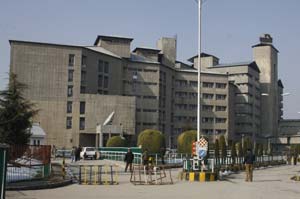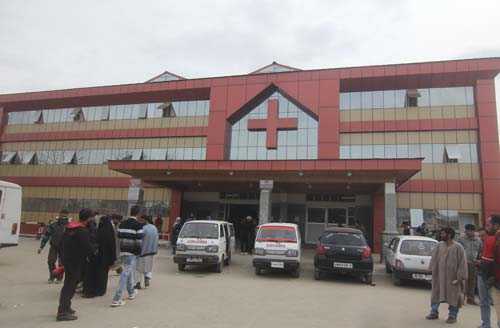With the lack of medicines and a crippling infrastructure ailing the healthcare at government-run hospitals in Kashmir valley, the patients of the ‘Royal Disease’ are facing a tough time to deal with the pain on one hand and a defunct administration on the other, Saima Bhat reports.
Bilal Wani, 17, is slouched on a bed at Srinagar’s SMHS hospital. With tears rolling down his cheeks, there are fifteen other patients who are carelessly chatting with each other in the ward while Bilal, a patient of hemophilia, weeps silently. He keeps rubbing his swollen left foot with the mattress to relieve the pain.
In the meantime, a nurse casually walks into the ward with Bilal’s father. She gives him a painkiller injection. “This will have its effect for next eight hours only after which he will be again in pain,” his father, Mohammad Akbar Wani says.
Bilal is the first person in his family who was born with hemophilia. At the time of his birth, his feet were slightly inclined backwards. “Initially we thought he was suffering from polio but I consulted doctors who examined him and told me that he was suffering from a blood disease. I wanted to change his blood but the doctors told me it will not help. They advised me to go outside the state for his treatment which was not possible,” Akbar says.
Akbar, a resident of Chandgam in Pulwama is barely literate. He earns his living by working as a laborer for four days. “On the fifth day, I have to come to Srinagar for my son’s treatment. The painkiller injection is available at SHMS free of cost which otherwise costs Rs 4000 for 250 ml. Sometimes, we have to return without injection and sometimes, when Bilal is in extreme pain and injection is not available, they give him FFP (fresh frozen plasma).”
Bilal is a Class 10 student but, his father says, when he was in Class 9, he missed two papers because of the disease. “While preparing for his papers which he had missed, Bilal was also preparing for his Class 10 exam without informing us. He saved his pocket money from which he bought his books. His disease is not letting him fulfill his dreams,” says Akbar.
Bilal’s arm and foot are damaged. He cannot walk properly and when he suffers from severe pain, his father travels around 50 km to reach Srinagar for his treatment. “We have to keep one person attached with Bilal. Last time when he was in pain, he said he wanted to commit suicide to relieve himself from the pain,” his father says.
“Bilal’s two joints have been dislocated because he is not under the treatment of a physiotherapist. Proper exercises are very important for such patients, otherwise joints get dislocated due to immovability. In SHMS, no physiotherapist is available and patients are not even advised to see one,” says a doctor at SMHS wishing anonymity.
I met at least fifteen patients at SHMS hospital who have been diagnosed with hemophilia. No one among them has visited any physiotherapist or gone for counseling. Hemophilia is a rare hereditary bleeding disorder. It occurs due to a deficiency in coagulation factor, which results in a condition of prolonged and abnormal bleeding- homeostasis. It results in bleeding inside the joints. The disease may be present at the time of birth (hereditary), or in some cases may occur later in life as well.
Dr Javaid Iqbal Khan, Hematologist and Transfusion specialist says it is Heredo Familiar Disease which is carried through females and manifested in males. The only treatment for hemophilia is the replacement of the missing clotting factor from healthy human blood plasma which is costly and risky treatment.
“In Kashmir valley, there are more than 500 known hemophilia patients while as the records of SHMS show that only 180 patients are registered with the hospital. Among them 90 percent of patients are suffering from hemophilia-A and the rest 10 percent have hemophilia-B. More than 90 percent of such patients are in the age group below 35 years. Only five females are registered and the rest remain unnoticed,” Dr Khan says.
The fact is that hemophilia patients can live a normal life, provided they get ‘good quality factor VIII (hemophilia-A) in proper quantity’, says Dr Khan. As per the guidelines on the patient’s card issued by doctors at SHMS, the medicines should be given to the hemophilic patients as per the degree of hemorrhage and their weight. However, the patients receive medication according to the availability in hospital.
Patients who are given medicines, other than factor VIII injections like FFP, prefer to leave without taking medicines. “This plasma gets us prone to HIV, Hepatitis C virus and other diseases. Why should we go and invite trouble for us?” asks a hemophilia patient, Mudasir. He recalls the case of Zahoor Ahmad, a hemophilia patient who was treated at SMHS hospital.
Zahoor, a junior engineer from Bandipora in north Kashmir, allegedly died due to heavy loss of blood in his kidney six months back. He was infected with Hepatitis-C due to substandard medicines given to patients at the hospital. “The Society for Hemophilic Centre, Kashmir (SHC) members say that the hospital administration was using these drugs to deceive the patients, especially the illiterates. Currently 200 patients are registered with SHC,” Mudasir says.
“If it is the right medicine, why are they using it behind curtains,” asks Mehraj Ahmad, a SHC member. Well-placed sources in SHMS hospital say the medicines available for hemophilia-A (factor VIII) patients are always in short supply while as for the hemophilia- B, medicines are present in abundance. The in-charge of the department, Dr Ruby Reshi was not available for comment while her juniors refused to comment on the matter. Conventionally, a hematologist should have headed the department unlike Dr Reshi, who is a pathologist.
A recent J&K High Court ruling directed the hospital authorities to keep hemophilia drugs ready for treatment of patients at hemophilia treatment centers. The state government had released an amount of Rs 1 crore each to medical colleges in Jammu and Srinagar to ensure the availability of medicines. When Medical Superintendent, SMHS, Dr Nazir Ahmad Chowdary was contacted, he refused to comment.
I met Dr Chowdary as an attendant of a patient. During the conversation, he told me that he had written at least 40 times to the higher authorities regarding the matter. “Why are you people disturbing us when we have already told you that we don’t have money to get medicines for you? From where should I get medicines? I advise you to meet the commissioner,” he told me.
The court had directed the government to provide adequate funds to hemophilia centers to ensure availability of the drugs so as to avoid any mishap. “Any such lapse would result in fixing the responsibility of an officer who has committed lapse,” the court observed.
In her seventies, Aisha Begum is sitting near the main entrance of Blood Bank at SHMS. She has come from Langate, Handwara with her three sons, Manzoor, 22, Shabir, 21 and Mushtaq, 18, who are all hemophilic. Her eldest son is only living a normal married life.
“My sons are suffering from some disease but I don’t know which disease it is. It has been six years since they were diagnosed with this disease. Before this, their joints used to swell. I thought their teachers were beating them at school,” says Aisha, a widow. “Every time I have to travel to Srinagar for treatment, I secretly collect money from some neighbors who are aware of my problems. All my sons have left their studies because of this disease. It is my destiny now. I regret my fate. All of them face problems while walking. I am too old to help them,” she says with tears welling up in her eyes.
Her son, Manzoor’s condition worsened in 2011 when medicines were not available in SHMS or SKIMS. “That time, some friend gave us address of a private clinic in Pulwama. We sold our land and bought plasma of about Rs 60,000. After that, we were again getting plasma in private. In total, we spent Rs 2.5 lakh. Still we couldn’t save his leg which has got locked now,” says Shabir, his brother.
Manzoor barely moves around and when he wishes to take a walk, he has to take help of a walking stick. After her three unsuccessful visits to SHMS, Aisha is lucky that medicines are today available. “Every time we come to Srinagar, I have to request one of our neighbor who owns a car to take us to Srinagar. I don’t know how I am going to pay him,” says Aisha.

















